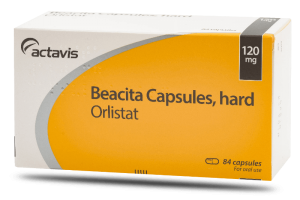Thinking of losing weight? You are not alone. 24.9% of the UK population is now considered to be obese. Everyone trying to lose weight has the same target in mind, but there are many different factors which can motivate you. This could be as simple as wanting to fit into your long lost pair of jeans, or it could be to reduce your risk of illnesses such as cancer, heart disease and type 2 diabetes. What is your motivator? Think about what motivates you personally.
To achieve weight loss, you need to consume fewer calories than your body needs to maintain its current weight. Sounds simple? The challenges of weight loss are not to be underestimated. Whilst it requires your commitment and discipline, it is achievable. Orlistat is not a wonder drug, but it can help you reduce the number of calories your body absorbs. It does this by blocking some of the fat that you eat from entering your bloodstream, and therefore cutting down on some of the calories that your body would otherwise store as fat! It requires you to simply take one capsule with each main meal and to also follow a fat and calorie controlled diet. Whilst, like any drug, it is not completely free from side effects, many can be controlled by sticking to a healthy balanced diet. The benefits of Orlistat, if you stick to the weight loss programme, are numerous.
Allow me to share some important facts about Orlistat, so you are left wanting to say, ‘Ready, Steady, Diet Today’!
Orlistat
£53.00 – £120.00
Orlistat has been proven to help patients lose weight in clinical trials. Orlistat is the generic, non-branded form of Xenical, and is therefore better value for money. Both medicines have exactly the same effectiveness.
SKU: N/A
Description
What Is Orlistat?
Orlistat can be used to help with weight loss. Rather than being an appetite suppressant it stops your body from absorbing the fat from food. This process helps the body to lose weight. Orlistat is not a single solution and should be used with a sensible calorie controlled diet.
Orlistat blocks approximately 1/3 of the fat from your food by attaching to enzymes in the digestive system and stopping them from breaking down the fat content of your food. The undigested fat is simply passed through your system.
How to Take Orlistat
The recommended dose of Orlistat is a 120-mg capsule taken with water with each meal that contains fat. You should take Orlistat up to three times a day in conjunction with a reduced-calorie diet. Each time you take Orlistat , your nutritionally balanced meal should contain no more than about 30% of calories from fat.
You should evenly divide your daily intake of fat, carbohydrates and protein over three main meals. Take Orlistat during meals or up to 1 hour after a meal. If you occasionally miss a meal or have a meal without fat, you can omit your dose of Orlistat . Doses above 120 mg three times daily have not been shown to provide an additional weight-loss benefit.
You should try to follow a healthy eating plan, such as one from which no more than 30% of calories come from fat. Following this eating plan will help you lose weight while decreasing some of the possible gastrointestinal effects you may experience while taking Orlistat . You may also need to adjust your calorie intake and/or your activity level, including reasonable exercise.
If your meal contains too much fat, you may experience diarrhoea. In the case of bloody stools, discontinue use and seek medical advice.
Vitamin Supplements
Because Orlistat interferes with your body’s absorption of some fat-soluble vitamins, you should take a daily multivitamin supplement that contains vitamins A, D, E and K and beta carotene once a day at least 2 hours before or after taking Orlistat , such as at bedtime
Patient Information Leaflet
Always read the patient information leaflet before commencing treatment. Patient information can be found here.
What is orlistat?
Orlistat is a weight loss medication. You may hear it referred to as Alli or Xenical, these are some of its brand names. As previously mentioned, it works by preventing the absorption of dietary fat. It does so by blocking an enzyme called pancreatic lipase. Pancreatic lipase’s job is to break down the fat we eat so that it can be absorbed into our bloodstream. By blocking this enzyme, Orlistat causes around 30% of dietary fat to be excreted unabsorbed in our poo. This reduces the amount of energy your body receives from the food you eat, and so will help you lose more weight than by diet alone!
In the UK, two strengths of Orlistat are available; 120mg (brand names include Xenical) and 60mg (brand name Alli). The 120mg Orlistat is a prescription only medicine to be used under the supervision of a doctor, whilst the 60mg Orlistat is available to purchase over the counter from a pharmacy. Both strengths of Orlistat are taken orally in the form of a capsule.
Who is it suitable for?
Orlistat is suitable if you are aged between 18 to 75 years and fall into the category of either overweight (BMI of 28kg/m2 or greater) or obese (BMI of 30kg/m2 or greater).4 A simple equation tells us whether you are overweight or obese by calculating your body mass index (BMI):
2(m)
There are online calculators which can calculate this for you, such as the one provided by the NHS at www.nhs.uk/BMI
If you are overweight (BMI 28kg/m2), you will need to be suffering from an associated risk factor (such as high cholesterol, high blood pressure or be a diabetic) to be able to use Orlistat. If you are clinically obese (BMI 30kg/m2), you do not need to have any associated risk factors to use Orlistat.
To be able to use Orlistat you will have to agree to follow a mildly reduced calorie diet (around 600 calories per day less than you usually eat). The aim is to lose around 5 to 10% of your total body weight over a period of 12 weeks.
Criteria to make sure Orlistat is suitable for you
| Age |
18-75years |
| BMI |
Overweight:28kg/m2 and associated risk factors (e.g. high blood pressure, high cholesterol or diabetic)
Or
Obese: 30kg/m2 |
|
| Aim |
Lose around 5-10% of your body weight over 12 weeks |
| Commitment |
Follow a low-calorie diet- around 600 calories less than normal
Follow a diet which has a fat content of 25-30%, around 10g per meal |
How should orlistat be taken?

Whether you decide to use the 120mg strength Orlistat or 60mg strength, the medication should be taken as:
One capsule three times a day with each main meal
Exactly when you take the medication with your main meal is your choice. It may be taken immediately before, during or up to 1 hour after each main meal.
Whilst taking Orlistat, you should commit to reducing your daily calories by 600 per day, and make sure that your diet is not comprised of more than 25-30% fat. You also need to make sure the bulk of your daily calorie intake is divided into 3 main meals. Snacking in between meals on fatty food should be avoided, as the Orlistat will not be able to block this fat!3 If you have a meal which you know is fat-free, then you are permitted to omit your dose of Orlistat, as it will not have any fat to block.
During the first three months of taking Orlistat, your weight loss will be monitored and if you have achieved a 5% loss in body weight during those first 12 weeks, you may continue to use Orlistat. Your Doctor may lower the 5% weight loss target if you have Type 2 Diabetes, but they will discuss this with you.
Overall, there is no restriction as to how long you can use Orlistat for, but your Doctor will review this with you after 12 months and make a decision based on you as an individual.
What else do I need to do?
In addition to taking the Orlistat capsules with each meal, you will also need to commit to following a healthy balanced diet, and for optimal results increase your exercise.
A healthy balanced diet is one which is rich in fruit, vegetables and starchy food (bread, pasta, rice and potatoes). When choosing your starchy foods aim for the high fibre options such as brown rice or wholemeal bread and pasta. These will release energy more slowly and keep you feeling fuller for longer. You should also aim to eat moderate amounts of dairy (equivalent to approximately 3 glasses of skimmed milk and a portion of low-fat yoghurt or cheese) and protein (lean meat, fish, eggs, beans and lentils). High-fat foods, sugar, salt and alcohol should be kept to a minimum.
To increase your exercise, you should aim to gradually increase the amount you do. The overall aim is to do 30 minutes of moderate intensity exercise daily on 5 days per week (although this may be split up into 10-minute sessions to make it more achievable). The main aim is to spend less time being inactive. A huge range of activities can be considered as exercise, from formal instructor-led classes, through to activities which you can incorporate into your everyday life (such as brisk walking or gardening).
Is there anyone who cannot take it?
There are some people who Orlistat is not suitable for. You may not be able to take Orlistat if you have an existing medical condition, or if you are taking certain other medication:
Existing Medical Condition
- Chronic malabsorption
- Cholestasis
- Oxalate nephrolithiasis
- Chronic kidney disease
- Impaired absorption of fat-soluble vitamins
- Volume depletion
Medication2,4
- Ciclosporin
- Levothyroxine
- Antiepileptics
- Warfarin and related anticoagulants
- Amiodarone
- Tacrolimus
- Acarbose
For some patients taking medication affected by Orlistat, changing the time when they take their medication means they can proceed to use Orlistat.4,5 Any decision about the use of Orlistat with existing medical conditions will be made in partnership with a Doctor.
Your Doctor will normally advise against using Orlistat if you are pregnant. It is recommended to avoid the use of Orlistat until after pregnancy, as it may interfere with the nutrients supplied to the foetus and the mother.4 It may be permitted in exceptional circumstances. Orlistat cannot be used whilst breastfeeding as we do not know if the drug passes into the breastmilk.4
What to expect when taking Orlistat
Side Effects
As with all medication, Orlistat can give us some side effects. The most common of which are gastrointestinal side effects (those which affect the digestive system). These come in the form of oily stools, abdominal discomfort due to bloating, needing to rush to the toilet to do a poo, and oily spotting on underwear. Importantly, it is worth noting that whilst these side effects show that the medication is working to eliminate fat undigested from the body, they can be controlled by lowering the fat content of the diet.4 As a result, over a period of continued use, many Orlistat users find that these side effects reduce.
I should also mention that some Orlistat users learn that higher fat meals will cause these side effects, and unfortunately avoid their Orlistat dose with these meals! 3 Please do not be tempted to do this. Your body will not be able to eliminate the additional fat without the help of the Orlistat.
Some of the vitamins your body needs to work properly are fat soluble. These are vitamins A, D, E and K. As Orlistat removes the fat from the diet, it can take these vitamins with it. Whilst in practice, this does not appear to cause vitamin deficiency in the majority of patients; 4 it is prudent to advise you to take a multivitamin supplement while you are taking Orlistat. The best time of day to take the multivitamin supplement is at bedtime or at least 2 hours after a dose of Orlistat. This is to make sure that the vitamins are properly absorbed by your body.4
Other common side effects include anxiety, gum problems, headache, low blood sugar, tiredness, changes to periods, respiratory infections, tooth disorders and water infections.5
A very rare side effect which may occur is hepatitis (a liver disorder).4 Therefore, all individuals choosing to take Orlistat should be aware of the signs of hepatitis, which include yellowing of the skin and eyes, itching, dark coloured urine, stomach pains and liver tenderness.4 If any of these occur, you are advised to stop taking Orlistat and seek advice from a Doctor.
What are the benefits of using orlistat?
By losing weight, you can make a huge impact on your health. Losing just 10kg of weight will reduce the total risk of death by between 20 to 25%.4 Blood pressure values fall by around 10mmHg when we lose 10kg,4 and this reduces the risk of heart attacks and strokes. The amount of unhealthy cholesterol that we carry in the blood will also reduce by around 15%,4 once again reducing the risk of heart attacks and strokes. Other potential benefits of weight loss are reductions in back and joint pain, breathlessness and sleep apnoea.4
If Orlistat is used correctly, for approximately every kilogram in weight loss by diet alone, you can expect to lose an extra half a kilogram.
When comparing Orlistat against a placebo, Orlistat has been shown to produce significantly greater weight loss after 12,24 and 48 months.4 A review of 15 studies on patients taking Orlistat found that participants average weight loss was 5.4kg after 12 months.4
During the time you take Orlistat, you should aim for weight loss of no more than 1 kg per week. This is to ensure that maintaining your weight loss is sustainable.4 After all, you are putting in the hard work, so you do not want to end up putting the weight back on!
Good luck!
Dieting is a challenge for anyone, but with the right help, that challenge can be made more rewarding.
References:
1. https://www.nhs.uk/Livewell/loseweight/Pages/statistics-and-causes-of-the-obesity-epidemic-in-the-UK.aspx Accessed 10/3/18
2. www.pharmaceutical-journal.com/career/career-feature/orlistat-and-possible-drug-interactions-that-can-affect-over-the-counter-sales/11009379.article Accessed 4/3/18
3. www.pharmaceutical-journal.com/learning/learning-article/get-to -grips-with-obesity-3-pharmacotherapy/10979027.article Accessed 4/3/18
4 https://cks.nice.org.uk/obesity Accessed 4/3/18
5. https://bnf.nice.org.uk/drug/orlistat.html#drugAction Accessed 4/3/18
6. http://www.rimed.org/rimedicaljournal/2017/03/2017-03-18-obesity-curry.pdf Accessed 4/3/18
Assured Pharmacy is not liable for the currency or accuracy of the information contained in this blog post. For specific information about your personal medical condition, please contact our doctors or pharmacists for advice on [email protected]











Reviews
There are no reviews yet.